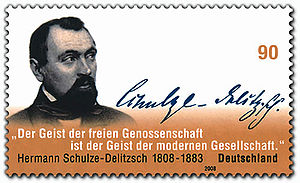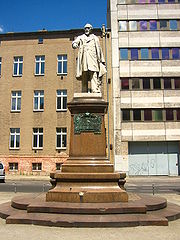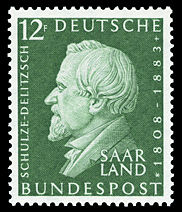
Franz Hermann Schulze-Delitzsch
Encyclopedia
Franz Hermann Schulze-Delitzsch (29 August 1808 - 29 April 1883) was a German
economist
. He was responsible for the organizing of the world's first credit union
s.
, in Prussian Saxony. He studied law
at Leipzig
and Halle universities and, when thirty, he became an assessor in the court of justice at Berlin
, and three years later was appointed patrimonial-richter at Delitzsch. Entering the parliament of 1848
, he joined the Left Centre
. At this time, his surname was expanded from Schulze to Schulze-Delitzsch: the name of his birthplace was appended to his surname to distinguish him from other Schulzes in the Prussian National Assembly. Acting as president of the commission of inquiry into the condition of the labourers and artisans, he became impressed with the necessity of co-operation to enable the smaller trades-people to hold their own against the capitalists.
 He was a member of the Second Chamber in 1848-1849; but as matters ceased to run smoothly between himself and the high legal officials, he gave up his public appointments in October 1851, and withdrew to Delitzsch. Here he devoted himself to the organization and development of co-operation in Germany, and to the foundation of Vorschussvereine (peoples' banks), of which he had established the first at Delitzsch in 1850. These developed so rapidly that Schulze-Delitzsch in 1858, in Die arbeitenden Klassen und das Assoziationswesen in Deutschland, enumerated twenty-five as already in existence. In these banks, the subscribers made small deposits, obtaining proportional credit and dividends. The management was vested in a board composed of subscribers.
He was a member of the Second Chamber in 1848-1849; but as matters ceased to run smoothly between himself and the high legal officials, he gave up his public appointments in October 1851, and withdrew to Delitzsch. Here he devoted himself to the organization and development of co-operation in Germany, and to the foundation of Vorschussvereine (peoples' banks), of which he had established the first at Delitzsch in 1850. These developed so rapidly that Schulze-Delitzsch in 1858, in Die arbeitenden Klassen und das Assoziationswesen in Deutschland, enumerated twenty-five as already in existence. In these banks, the subscribers made small deposits, obtaining proportional credit and dividends. The management was vested in a board composed of subscribers.
 In 1859 the more than 200 such banks were centrally organized under the direction of Schulze-Delitzsch. He promoted the first Genossenschaftstag, a co-operative meeting, in Weimar
In 1859 the more than 200 such banks were centrally organized under the direction of Schulze-Delitzsch. He promoted the first Genossenschaftstag, a co-operative meeting, in Weimar
, and founded a central bureau of co-operative societies. In 1861 he again entered the Prussian Chamber, and became a prominent member of the Progressist party. In 1863 he devoted the chief portion of a testimonial, amounting to £7500, to the maintenance of his co-operative institutions and offices. This, however, was only to meet an exceptional outlay, for he always insisted that they must be self-supporting. The next three or four years were given to the formation of local centres, and the establishment of the Deutsche Genossenschafts-Bank, 1865.
The spread of these organizations naturally led to legislation on the subject, and this too was chiefly the work of Schulze-Delitzsch. As a member of the Chamber in 1867 he was mainly instrumental in passing the Prussian law of association
, which was extended to the North German Confederation in 1868, and later to the empire. Schulze-Delitzsch also contributed to uniformity of legislation throughout the states of Germany, in 1869, by the publication of Die Gesetzgebung über die privatrechtliche Stellung der Erwerbs- und Wirthschaftsgenossenschaften, etc.
With the legislation in place, his life's work was complete; he had placed the advantages of capital and co-operation within the reach of struggling tradesmen throughout Germany.
His remaining years were spent in consolidating this work.
He endeavored to accustom the people to rely upon their own initiative to improve their condition, and declared that the function of the state should be limited to assuring industrial and personal liberty.
Both as a writer and a member of the Reichstag
his industry was incessant, and he died in harness on 29 April 1883 at Potsdam
, leaving the reputation of a benefactor to the smaller tradesmen and artisans, in which light he must be regarded rather than as the founder of true co-operative principles in Germany.
At the time of his death, there were in Germany alone 3,500 co-operative banking branches with more than $100,000,000 in deposits, while the system had been extended to Austria
, Italy
, Belgium
and Russia
.

Germany
Germany , officially the Federal Republic of Germany , is a federal parliamentary republic in Europe. The country consists of 16 states while the capital and largest city is Berlin. Germany covers an area of 357,021 km2 and has a largely temperate seasonal climate...
economist
Economist
An economist is a professional in the social science discipline of economics. The individual may also study, develop, and apply theories and concepts from economics and write about economic policy...
. He was responsible for the organizing of the world's first credit union
Credit union
A credit union is a cooperative financial institution that is owned and controlled by its members and operated for the purpose of promoting thrift, providing credit at competitive rates, and providing other financial services to its members...
s.
History
Schulze-Delitzsch was born at DelitzschDelitzsch
Delitzsch is a large district and also an important regional center in Saxony. With over 26,300 inhabitants Delitzsch is the largest city in the northern district of Saxony...
, in Prussian Saxony. He studied law
Law
Law is a system of rules and guidelines which are enforced through social institutions to govern behavior, wherever possible. It shapes politics, economics and society in numerous ways and serves as a social mediator of relations between people. Contract law regulates everything from buying a bus...
at Leipzig
University of Leipzig
The University of Leipzig , located in Leipzig in the Free State of Saxony, Germany, is one of the oldest universities in the world and the second-oldest university in Germany...
and Halle universities and, when thirty, he became an assessor in the court of justice at Berlin
Berlin
Berlin is the capital city of Germany and is one of the 16 states of Germany. With a population of 3.45 million people, Berlin is Germany's largest city. It is the second most populous city proper and the seventh most populous urban area in the European Union...
, and three years later was appointed patrimonial-richter at Delitzsch. Entering the parliament of 1848
Prussian National Assembly
The Prussian National Assembly came into being after the 1848 revolutions and was tasked with drawing up a constitution for the Kingdom of Prussia. It first met in the Berlin Singakademie....
, he joined the Left Centre
Left-wing politics
In politics, Left, left-wing and leftist generally refer to support for social change to create a more egalitarian society...
. At this time, his surname was expanded from Schulze to Schulze-Delitzsch: the name of his birthplace was appended to his surname to distinguish him from other Schulzes in the Prussian National Assembly. Acting as president of the commission of inquiry into the condition of the labourers and artisans, he became impressed with the necessity of co-operation to enable the smaller trades-people to hold their own against the capitalists.


Weimar
Weimar is a city in Germany famous for its cultural heritage. It is located in the federal state of Thuringia , north of the Thüringer Wald, east of Erfurt, and southwest of Halle and Leipzig. Its current population is approximately 65,000. The oldest record of the city dates from the year 899...
, and founded a central bureau of co-operative societies. In 1861 he again entered the Prussian Chamber, and became a prominent member of the Progressist party. In 1863 he devoted the chief portion of a testimonial, amounting to £7500, to the maintenance of his co-operative institutions and offices. This, however, was only to meet an exceptional outlay, for he always insisted that they must be self-supporting. The next three or four years were given to the formation of local centres, and the establishment of the Deutsche Genossenschafts-Bank, 1865.
The spread of these organizations naturally led to legislation on the subject, and this too was chiefly the work of Schulze-Delitzsch. As a member of the Chamber in 1867 he was mainly instrumental in passing the Prussian law of association
Bond of association
The bond of association or common bond is the social connection among the members of credit unions and co-operative banks. Common bonds substitute for collateral in the early stages of financial system development...
, which was extended to the North German Confederation in 1868, and later to the empire. Schulze-Delitzsch also contributed to uniformity of legislation throughout the states of Germany, in 1869, by the publication of Die Gesetzgebung über die privatrechtliche Stellung der Erwerbs- und Wirthschaftsgenossenschaften, etc.
With the legislation in place, his life's work was complete; he had placed the advantages of capital and co-operation within the reach of struggling tradesmen throughout Germany.
His remaining years were spent in consolidating this work.
He endeavored to accustom the people to rely upon their own initiative to improve their condition, and declared that the function of the state should be limited to assuring industrial and personal liberty.
Both as a writer and a member of the Reichstag
Reichstag (German Empire)
The Reichstag was the parliament of the North German Confederation , and of the German Reich ....
his industry was incessant, and he died in harness on 29 April 1883 at Potsdam
Potsdam
Potsdam is the capital city of the German federal state of Brandenburg and part of the Berlin/Brandenburg Metropolitan Region. It is situated on the River Havel, southwest of Berlin city centre....
, leaving the reputation of a benefactor to the smaller tradesmen and artisans, in which light he must be regarded rather than as the founder of true co-operative principles in Germany.
At the time of his death, there were in Germany alone 3,500 co-operative banking branches with more than $100,000,000 in deposits, while the system had been extended to Austria
Austria
Austria , officially the Republic of Austria , is a landlocked country of roughly 8.4 million people in Central Europe. It is bordered by the Czech Republic and Germany to the north, Slovakia and Hungary to the east, Slovenia and Italy to the south, and Switzerland and Liechtenstein to the...
, Italy
Italy
Italy , officially the Italian Republic languages]] under the European Charter for Regional or Minority Languages. In each of these, Italy's official name is as follows:;;;;;;;;), is a unitary parliamentary republic in South-Central Europe. To the north it borders France, Switzerland, Austria and...
, Belgium
Belgium
Belgium , officially the Kingdom of Belgium, is a federal state in Western Europe. It is a founding member of the European Union and hosts the EU's headquarters, and those of several other major international organisations such as NATO.Belgium is also a member of, or affiliated to, many...
and Russia
Russia
Russia or , officially known as both Russia and the Russian Federation , is a country in northern Eurasia. It is a federal semi-presidential republic, comprising 83 federal subjects...
.
See also

- Bond of associationBond of associationThe bond of association or common bond is the social connection among the members of credit unions and co-operative banks. Common bonds substitute for collateral in the early stages of financial system development...
- Friedrich Wilhelm RaiffeisenFriedrich Wilhelm RaiffeisenFriedrich Wilhelm Raiffeisen was a German mayor and cooperative pioneer. Several credit union systems and cooperative banks have been named after Raiffeisen, who pioneered rural credit unions.- Life :...
- History of credit unions

